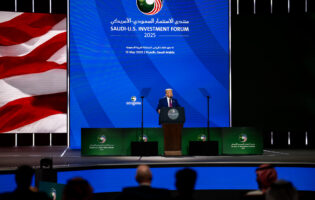
Miroslav Vajdic via Flickr
Beyond Pandemic: China, 17+1, and the Influence Competition in the CEE Region

Yixiang Xu
China Fellow; Program Officer, Geoeconomics
Yixiang Xu is the China Fellow and Program Officer, Geoeconomics at AGI, leading the Institute’s work on U.S. and German relations with China. He has written extensively on Sino-EU and Sino-German relations, transatlantic cooperation on China policy, Sino-U.S. great power competition, China's Belt-and-Road Initiative and its implications for Germany and the U.S., Chinese engagement in Central and Eastern Europe, foreign investment screening, EU and U.S. strategies for global infrastructure investment, 5G supply chain and infrastructure security, and the future of Artificial Intelligence. His written contributions have been published by institutes including The Chinese Academy of Social Sciences, The United States Institute of Peace, and The Asia Society's Center for U.S.-China Relations. He has spoken on China's role in transatlantic relations at various seminars and international conferences in China, Germany, and the U.S.
Mr. Xu received his MA in International Political Economy from The Josef Korbel School of International Studies at The University of Denver and his BA in Linguistics and Classics from The University of Pittsburgh. He is an alumnus of the Bucerius Summer School on Global Governance, the Global Bridges European-American Young Leaders Conference, and the Brussels Forum's Young Professionals Summit. Mr. Xu also studied in China, Germany, Israel, Italy, and the UK and speaks Mandarin Chinese, German, and Russian.
__
Ever since the inception of the China-CEEC (Central and Eastern European Countries) Initiative in 2012, officials and politicians in many Western European countries as well as the European Union have viewed it as a Chinese influence-buying campaign that seeks to divide the EU. There is evidence to support this accusation. EU member states such as Greece and Hungary have refused to join EU statements condemning China’s human rights practices. And this month, Hungarian foreign minister Peter Szijjarto vowed to oppose Taiwan’s membership at the World Health Organization, despite France and Germany’s petition to restore the island’s observer status.
The COVID-19 pandemic exacerbated EU concerns over the future of Chinese influence in the CEE region. China could leverage its export of personal protective equipment (PPE) and other medical supplies to score additional political gains in CEE countries. Distressed industrial and strategic assets in the region in the ensuing economic recession could be attractive targets for Chinese takeovers. But aggressive Chinese diplomatic campaign to turn its mask diplomacy into a success story is provoking a backlash in the region.
As the U.S.-China confrontation increasingly spill over to Europe, the tug of war between Washington and Beijing is turning the CEE region into a new theater of great power competition for influence.
Propaganda and Disillusion
When the virus started to spread in Europe, many CEE countries used their connections in China to secure the purchase of vital medical equipment. Some government officials were photographed welcoming Chinese deliveries at airports during the early days of Europe’s pandemic response and on March 13, CEE governments participated in a 17+1 video conference aimed at sharing China’s containment experience.
But as Chinese efforts to spin its mask diplomacy intensified, some CEE governments and politicians pushed back on Beijing’s aggressive messaging. The Slovak Ministry of Foreign Affairs, for instance, publicly decried pandemic-related disinformation from China. Independent media and China experts in CEE countries pointed out that the majority of the medical supplies from China were government or corporate purchases instead of free aid and some of the deliveries were substandard.
Despite years of a sustained Chinese diplomatic charm offensive in the region, many CEE countries have become disillusioned by unfulfilled promises.
These developments are indicative of the reality that despite years of a sustained Chinese diplomatic charm offensive in the region, many CEE countries have become disillusioned by unfulfilled promises and are increasingly alarmed by the new Chinese “wolf warrior” diplomacy on their own turf.
Of the $15.4 billion China invested in the sixteen China-CEEC partner countries in Europe (excluding Greece) between 2012 and 2019, almost 70 percent went to the five non-EU members in the Balkans. Chinese FDI in the EU reached a five-year low in 2019 and the CEE region accounted to just 3 percent of that. Announcing his decision to skip this year’s 17+1 summit, Czech president Miloš Zeman snubbed China for failing to deliver promised investment.
Increased trade with China has also ballooned the CEE trade deficit, amounting to $75 billion in 2018, leading many in the region to question the benefit of closer economic relations with Beijing. Furthermore, Europe’s medical supply crisis during the pandemic presents countries such as Bulgaria and Poland with an opportunity to increase domestic production of strategic goods for the EU, putting them in direct competition with China.
At the same time, China seems to have swapped careful bilateral diplomacy for attacks by its “wolf warrior” diplomats against any perceived challenge to Beijing’s agenda. This has met backlash from CEE countries. In January this year, after the Chinese embassy in Prague threatened to retaliate against Czech companies operating in China over a planned visit by Senate speaker Jaroslav Kubera to Taiwan, Czech prime minister Andrej Babiš called for the Chinese ambassador to be replaced. After Slovakia appealed to the EU for help to counter Chinese pressure over the Čaputová government’s criticism of China’s human rights records, 26 Slovak parliamentarians signed a joint statement by legislators and policymakers from 23 countries condemning Beijing’s unilateral introduction of national security legislation in Hong Kong.
China, the U.S., and the Future of Influence Competition
It seems the honeymoon period of the China-CEEC relationship has ended. Chinese preoccupation with post-pandemic domestic economic recovery and outstanding Belt-and-Road debt repayment could reduce Beijing’s economic clout. But China is not going away. The pandemic-induced economic recession is forecasted to drive CEE countries into the worst recession they have experienced since the early 1990s. Although the EU has agreed on a €540 billion rescue package, a large chunk of it, €240 billion allocated for the European Stability Mechanism, would only be available to euro zone countries, making it difficult for many CEE members to stimulate growth through fiscal spending. For them, the 17+1 initiative could be an attractive source of financial relief.
Chinese investment in regional infrastructure could continue to be welcomed by CEE countries as well. EU financing for CEE infrastructure development has been unable to meet local demand. For some countries, low bids from Chinese construction companies and easy funding access from Chinese state-owned banks will help to hold China’s place as an important regional player.
Expanding confrontation between China and the U.S. is directing Washington’s attention to the CEE.
But Beijing will have more competition. Expanding confrontation between China and the U.S. is directing Washington’s attention to the CEE. The Trump administration is supporting the Three Seas Initiative (3SI), a regional effort to expand cross-border energy, transportation, and digital infrastructure and boost economic development in the area between the Adriatic Sea, Baltic Sea, and Black Sea. U.S. Secretary of State Mike Pompeo announced a U.S. commitment of up to $1 billion in financing for 3SI countries, possibly through the newly founded U.S. International Development Finance Corporation (DFC). The U.S. is also having more success with its campaign against Chinese 5G equipment in the region. Washington signed bilateral agreements with Warsaw and Prague to cooperate on 5G security.
Some see increased U.S. engagements in the region as an opportunity for closer transatlantic cooperation. Their argument is that the EU provides economic opportunities and the U.S., through NATO, provides a security guarantee, a sort of match made in heaven for safeguarding the region’s democracy and political orientation from Chinese influence.
It sounds good in theory. But, on closer inspection, this dream team should not be taken for granted for the benefit of internal EU cohesion. The 3SI has its roots in Euroskeptic politics. Championed by the Polish president Andrzej Duda, the initiative aims to organize regional cooperation around the concept of Intermarium, arcing back to the golden era of Polish-Lithuanian Commonwealth. Although 3SI is clearly no alternative for the EU, it could offer a platform for opposing major EU policies on issues such as migration and climate change. Closer U.S.-CEE relations can only lead to more EU solidarity if Washington consults Brussels on policy issues in the region. Under the Trump administration, there’s scarce evidence of that.
Democratic backsliding has also been a major issue in countries like Poland and Hungary. If growing U.S. cooperation in the region does not insist on sound democratic governance, transparency, and accountability, it could embolden some CEE countries to leverage their relationship with the U.S. against the EU on both democratic principles and policy matters.
The COVID-19 pandemic does not bring the end of an era of active Chinese engagement in the CEE region. CEE public opinion and Beijing’s strategy are both shifting. But China will remain a strong player in the region. Increased U.S. interests in bilateral cooperation with CEE countries certainly pose competition for China and could contribute to regional development. The EU will need to work hard to ensure that its own contributions are not overlooked and navigate the new regional influence competition toward a more coherent union.









